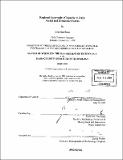| dc.contributor.advisor | James M. Utterback. | en_US |
| dc.contributor.author | Busa, Federica | en_US |
| dc.contributor.other | Massachusetts Institute of Technology. Management of Technology Program. | en_US |
| dc.date.accessioned | 2006-03-24T16:18:27Z | |
| dc.date.available | 2006-03-24T16:18:27Z | |
| dc.date.copyright | 2003 | en_US |
| dc.date.issued | 2003 | en_US |
| dc.identifier.uri | http://hdl.handle.net/1721.1/29718 | |
| dc.description | Thesis (S.M.M.O.T.)--Massachusetts Institute of Technology, Sloan School of Management, Management of Technology Program, 2003. | en_US |
| dc.description | Includes bibliographical references (leaves 70-73). | en_US |
| dc.description.abstract | The notion of clustering, defined as the localized value-creating system that comprises complementary firms, universities, investors and other private or public institutions, has become of critical importance for regional innovation policies. This thesis explores regional innovative capacity in Italy, where industrial districts or clusters of small and medium enterprises (SMEs) have represented a strong economic force responsible for the country's economic vitality and growth. In order to respond to the changing global economic environment, that is challenging Italian regional clusters to achieve sustainable growth, a new notion of meta-cluster has recently emerged. Metaclusters extend the traditional definition to encompass the entire value chain of an industrial cluster. The thesis argues that the notion of meta-clusters is key to the future innovative activities, given the nature of relations between government, university and industry in Italy, the underlying fabric of the country's economic system and a number of case studies of SMEs. Meta-clusters will not involve improbable developments in new technologies disconnected from the local resources, but rather will leverage and enhance existing value chains through new process, technologies and innovation strategies. Part of the argument assumes a prominent role of regional institutions, as the catalysts for innovation upgrades, and of financial intermediaries, as the glue in the development of stronger relationships between industry, government and universities. | en_US |
| dc.description.statementofresponsibility | by Federica Busa. | en_US |
| dc.format.extent | 73 leaves | en_US |
| dc.format.extent | 3064409 bytes | |
| dc.format.extent | 3064214 bytes | |
| dc.format.mimetype | application/pdf | |
| dc.format.mimetype | application/pdf | |
| dc.language.iso | eng | en_US |
| dc.publisher | Massachusetts Institute of Technology | en_US |
| dc.rights | M.I.T. theses are protected by copyright. They may be viewed from this source for any purpose, but reproduction or distribution in any format is prohibited without written permission. See provided URL for inquiries about permission. | en_US |
| dc.rights.uri | http://dspace.mit.edu/handle/1721.1/7582 | |
| dc.subject | Management of Technology Program. | en_US |
| dc.title | Regional innovative capacity in Italy : social and economic forces | en_US |
| dc.type | Thesis | en_US |
| dc.description.degree | S.M.M.O.T. | en_US |
| dc.contributor.department | Management of Technology Program. | en_US |
| dc.contributor.department | Sloan School of Management | |
| dc.identifier.oclc | 54032087 | en_US |
